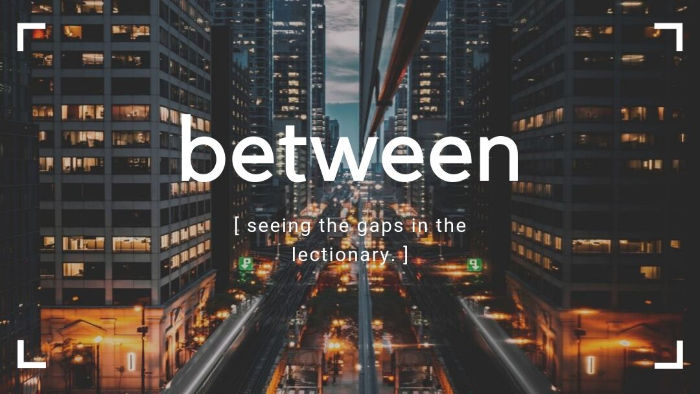A look at the gaps in the lectionary.
This week: the gap between Proper 5B & 6B
The text: Mark 4:1-25
By the time we reach chapter four, we’ve already experienced intense emotions and challenging teaching. Which is why I’m reluctant to simply dive into this week’s reading about the sower like it’s a lovely little teaching that maybe we ought to consider thinking about.
And yet, this is the first section that feels like a traditional teaching. Jesus calls it a parable, and that seems to be the sweet spot for most Christians. We love to hear stories that we can apply to our own lives.
It is a kind of comfortable ignorance, of course. The kind that wants to get past that uncomfortable talk about families and Sabbath. Maybe we just talk in general terms about people so we can learn how to be good.
Discrimination
The parable of the sower, the first part we skip in the lectionary (4:1-20) speaks to seeds and growth. It names the different capacities for growth. But it isn’t very comforting and it tends to get us speculating about the designs of God.
What is fascinating about it is that it offers something like a riddle about sin and screwing up. Does God put us in spots to screw up—which implies we have no agency. Or do we have agency?
Perhaps there’s another way to look at it.
We are not the seeds always being tossed into these particular places. We are in places where seeds have gone before. And some of those seeds grow up to block the shade or steal all of the water.
Are we truly prisoners of our environment?
The question is not merely whether or not we are in a bad spot or, oppositionally therefore a bad seed. Are we not also part of that environment, influencing it? And are we also not able to reject one environment and move to another?
In a sense, Jesus demonstrates this as he chooses for himself his “real” family.
We’re also being pedantic.
Because it doesn’t seem as if Jesus has any interest in taking his metaphor literally. He uses an image to talk about a spirit being planted in us and in the world and we’re just like the disciples going “What’s all this about the seeds, Teacher?”
When he says “And these are the ones sown on the good soil: they hear the word and accept it and bear fruit,” it doesn’t sound like he’s talking about human nature or environments. Nature versus Nurture. He’s like, Some people get it and it works through them.
Our box for Jesus’s teaching is limiting because of our present bias for the political binary. And this, too, codes our thinking into making it about the moral defects of people themselves or some moral defect in the environment.
And sometimes, our response to this is to offer the proverbial “pox on both your houses” and split the difference. So we might say, Yes, some people are broken and also so is society. But this doesn’t seem to get at Jesus’s message any better.
Jesus does speak to an inevitability here, but not in the negative, nor in the absolute. He isn’t saying this is how people are. He names all the temptations and excuses we use to not get with the program. And that, since he is offering counterprogramming, meaning most people are taken with any number of excuses rather than listen to some backwoods hillbilly talk about love and liberation.
That a lot of people do seem interested in Jesus shows the hunger people have for thinking differently.
And no hiding!
The last part is a familiar bit about not hiding the lamp under a bushel basket. This is an easier teaching to track with, for sure. We get the metaphor more innately—don’t hide what we are supposed to show—and that fits in a lot of ways.
This teaching ends curiously, however. It is an inversion of the teaching Jesus makes everywhere else: that the first will be firster and the last will be laster. It doesn’t make sense in context or in the wider context. Unless, of course, this isn’t a grand statement about the Dream of God—how things are supposed to be in the Kin-dom.
It would make sense if we’re talking about the kingdoms of earth, where the rich get richer and poor get poorer. Where those who are good at something don’t just benefit, they benefit off the backs of others.
This, of course, is too literal, too!
Jesus is talking about listening. He isn’t talking about the grand scheme of how we order the world! He’s talking about people who get the Dream itself. Do you hear it? Get it? Yeah, then you will get more of it! It all will make more sense.
And those who don’t get it? Do you think what will come will suddenly make sense? No! For the confused, it will be even more confusing.
Our own teachings and priorities—how does all of this speak to them?
